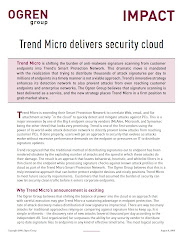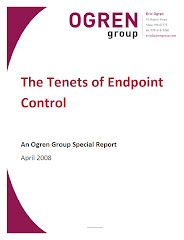Posted May 26th on SearchSecurity ...
"While it is important to have technology that can automatically block violations of acceptable use policies, it is more important to have end users that know their responsibilities and application developers that integrate data security. That's where audit, discovery and reporting features come into play when evaluating data protection products such as data leakage prevention, endpoint device control and rights management systems..."
Wednesday, May 27, 2009
Friday, May 22, 2009
Software piracy pandemic needs government role, better vendor antipiracy plans
Posted earlier this week on Tech Target's SearchSecurity.com ...
A satisfactory solution to the business software piracy problem has proven elusive to the software industry. Draconian measures, such as rights management systems or hands-on key management systems, can drive up customer costs in IT administration, while in consumer markets the cost of a single support call can erode all profit margins and may even exceed the price of the product.
A satisfactory solution to the business software piracy problem has proven elusive to the software industry. Draconian measures, such as rights management systems or hands-on key management systems, can drive up customer costs in IT administration, while in consumer markets the cost of a single support call can erode all profit margins and may even exceed the price of the product.
Saturday, May 16, 2009
Posted opinion on Citrix series of announcements
Recent post to TechTarget on the Citrix announcements.
One way for IT to dip their toe in the cloud computing waters is by providing internal users with a corporate hosted application service that IT controls. This gives IT the ability to monitor usage patterns and could reduce operating expenses. The key capability of an application service is to deliver compliant applications and desktops to end users with performance close to what would be experienced if the applications were locally installed.
App service cloud could boost security, manageability
One way for IT to dip their toe in the cloud computing waters is by providing internal users with a corporate hosted application service that IT controls. This gives IT the ability to monitor usage patterns and could reduce operating expenses. The key capability of an application service is to deliver compliant applications and desktops to end users with performance close to what would be experienced if the applications were locally installed.
App service cloud could boost security, manageability
Feds should get private sector advice on cybersecurity
Posted on SearchSecurity.com earlier this month
Feds should get private sector advice on cybersecurity
Feds should get private sector advice on cybersecurity
Monday, May 4, 2009
VMware should push towards becoming the de facto standard
The latest issue of NetworkWorld dings VMware for not supporting Microsoft and Citrix hypervisors with their vSphere release, claiming VMware’s strategy promotes “vendor lock-in”. Well, duh. Who said supporting other hypervisors was a market requirement for VMware?
Enterprises typically buy technology products because they offer the best features match for the desired functionality, offer the best performance for the business, or offer the best economics between purchase price and operating costs. IT has made the decision to make VMware the market leader for virtualized datacenters because of functionality and performance. Other factors, such as vendor relationship, product roadmap, open support for competitors are usually relegated to tie-breakers. IT strived to control the datacenter – I have not talked with too many IT folks that strive for a mish-mash of hypervisors for corporate applications in the virtual datacenter.
In terms of competition, Microsoft will successfully compete on price, and will be penetrating the market via small and mid-tier organizations. They always do, and they always do it well. I have spoken with companies that will switch to Hyper-V as soon as it is enterprise-ready. Citrix competes on performance, especially when it comes to application delivery to the desktop. Yes, Xen has open source roots, but customers buy predominantly because Citrix Xen delivers a local experience to virtual desktop and can save huge operating costs for endpoint management.
I do not often see vendor lock-in as an overriding issue in emerging markets, and I certainly don’t see it here for VMware’s vSphere. VMware's mission is to become the de facto standard for virtualization in the data center, which will drag an eco-system with financial benefits for the installed base. I’m not sure how vendor lock-in is even a major customer concern at this early stage of the market. Am I missing something here?
Enterprises typically buy technology products because they offer the best features match for the desired functionality, offer the best performance for the business, or offer the best economics between purchase price and operating costs. IT has made the decision to make VMware the market leader for virtualized datacenters because of functionality and performance. Other factors, such as vendor relationship, product roadmap, open support for competitors are usually relegated to tie-breakers. IT strived to control the datacenter – I have not talked with too many IT folks that strive for a mish-mash of hypervisors for corporate applications in the virtual datacenter.
In terms of competition, Microsoft will successfully compete on price, and will be penetrating the market via small and mid-tier organizations. They always do, and they always do it well. I have spoken with companies that will switch to Hyper-V as soon as it is enterprise-ready. Citrix competes on performance, especially when it comes to application delivery to the desktop. Yes, Xen has open source roots, but customers buy predominantly because Citrix Xen delivers a local experience to virtual desktop and can save huge operating costs for endpoint management.
I do not often see vendor lock-in as an overriding issue in emerging markets, and I certainly don’t see it here for VMware’s vSphere. VMware's mission is to become the de facto standard for virtualization in the data center, which will drag an eco-system with financial benefits for the installed base. I’m not sure how vendor lock-in is even a major customer concern at this early stage of the market. Am I missing something here?
Subscribe to:
Comments (Atom)







